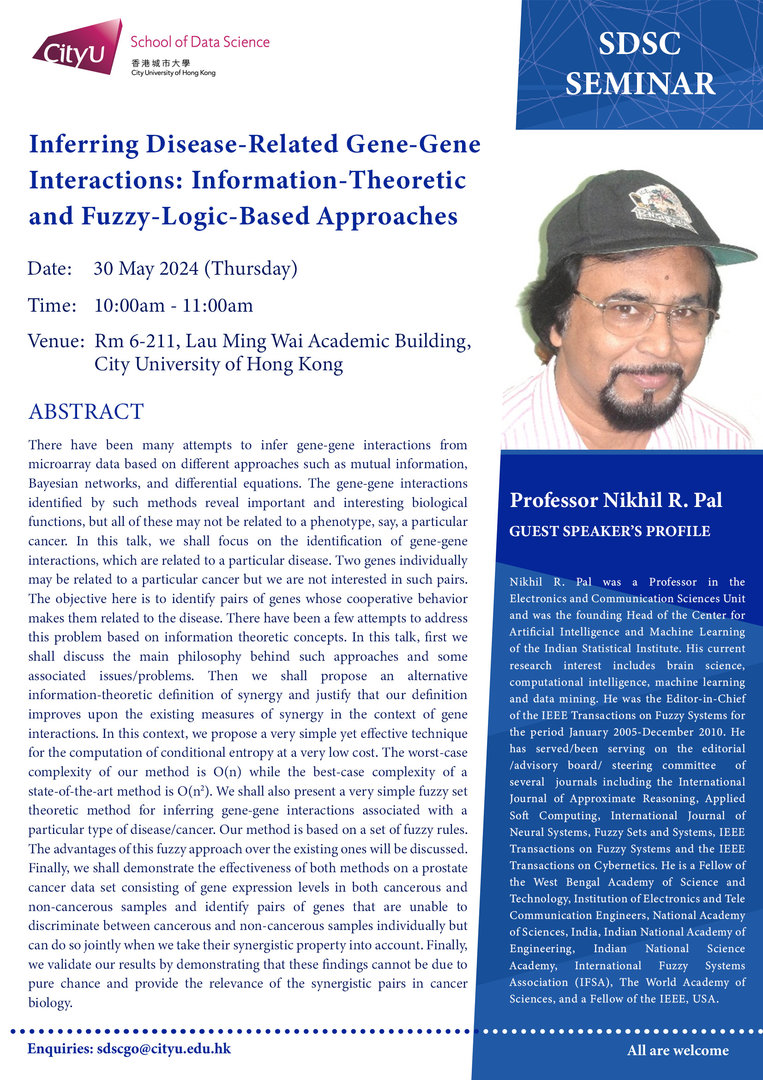
There have been many attempts to infer gene-gene interactions from microarray data based on different approaches such as mutual information> Bayesian networks> and differential equations. The gene-gene interactions identified by such methods reveal important and interesting biological functions> but all of these may not be related to a phenotype> say> a particular cancer. In this talk> we shall focus on the identification of gene-gene interactions> which are related to a particular disease. Two genes individually may be related to a particular cancer but we are not interested in such pairs. The objective here is to identify pairs of genes whose cooperative behavior makes them related to the disease. There have been a few attempts to address this problem based on information theoretic concepts. In this talk> first we shall discuss the main philosophy behind such approaches and some associated issues/problems. Then we shall propose an alternative information-theoretic definition of synergy and justify that our definition improves upon the existing measures of synergy in the context of gene interactions. In this context> we propose a very simple yet effective technique for the computation of conditional entropy at a very low cost. The worst-case complexity of our method is O(n) while the best-case complexity of a state-of-the-art method is O(n2). We shall also present a very simple fuzzy set theoretic method for inferring gene-gene interactions associated with a particular type of disease/ cancer. Our method is based on a set of fuzzy rules. The advantages of this fuzzy approach over the existing ones will be discussed. Finally> we shall demonstrate the effectiveness of both methods on a prostate cancer data set consisting of gene expression levels in both cancerous and non-cancerous samples and identify pairs of genes that are unable to discriminate between cancerous and non-cancerous samples individually but can do so jointly when we take their synergistic property into account. Finally> we validate our results by demonstrating that these findings cannot be due to pure chance and provide the relevance of the synergistic pairs in cancer biology. /span>
Speaker: Professor Nikhil R. PAL
Date: 30 May 2024 (Thursday)
Time: 10:00am – 11:00am
Poster: Click here
Latest Seminar
Biography
Nikhil R. Pal was a Professor in the Electronics and Communication Sciences Unit and was the founding Head of the Center for Artificial Intelligence and Machine Learning of the Indian Statistical Institute. His current research interest includes brain science, computational intelligence, machine learning and data mining.
He was the Editor-in-Chief of the IEEE Transactions on Fuzzy Systems for the period January 2005-December 2010. He has served/been serving on the editorial /advisory board/ steering committee of several journals including the International Journal of Approximate Reasoning, Applied Soft Computing, International Journal of Neural Systems, Fuzzy Sets and Systems, IEEE Transactions on Fuzzy Systems and the IEEE Transactions on Cybernetics.
He is a recipient of the 2015 IEEE Computational Intelligence Society (CIS) Fuzzy Systems Pioneer Award and 2021 IEEE CIS Meritorious Service Award. He has given many plenary/keynote speeches in different premier international conferences in the area of computational intelligence. He has served as the General Chair, Program Chair, and co-Program chair of several conferences. He has been a Distinguished Lecturer of the IEEE CIS (2010-2012, 2016-2018, 2022-2024) and was a member of the Administrative Committee of the IEEE CIS (2010-2012). He has served as the Vice-President for Publications of the IEEE CIS (2013-2016) and the President of the IEEE CIS (2018-2019).
He is a Fellow of the West Bengal Academy of Science and Technology, Institution of Electronics and Tele Communication Engineers, National Academy of Sciences, India, Indian National Academy of Engineering, Indian National Science Academy, International Fuzzy Systems Association (IFSA), The World Academy of Sciences, and a Fellow of the IEEE, USA.